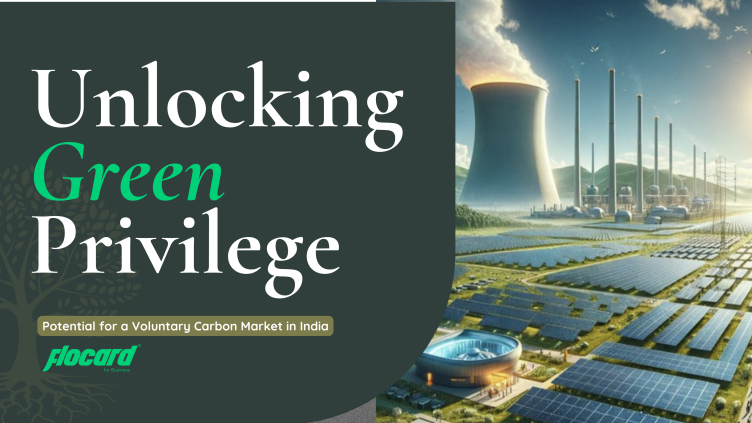India's Path to a Low-Carbon Future: Exploring the Voluntary Carbon Market

Exploring the Potential for a Voluntary Carbon Market in India
Climate change, driven by the increased concentration of greenhouse gases (GHGs) due to fossil fuel combustion, deforestation, and industrial activities, has significantly raised the levels of carbon dioxide (CO2) and other GHGs in the atmosphere, leading to climate challenges. Addressing climate change requires a multifaceted approach to reduce GHG emissions and enhance carbon sinks. Carbon markets create financial value for emission reductions, encouraging innovation and investment in low-carbon technologies and practices.
The Voluntary Carbon Market (VCM) is where private entities and communities buy and sell carbon credits to offset their emissions. This not only reduces carbon emissions but also demonstrates companies' commitment to sustainability and appeals to environmentally conscious consumers.
India's Climate Goals and Commitments
India has committed to the Paris Agreement, an international treaty aimed at limiting global warming to well below 2°C, preferably to 1.5°C, compared to pre-industrial levels. India’s Nationally Determined Contributions (NDCs) outline its climate action targets, including reducing emission intensity, increasing renewable energy capacity, and enhancing carbon sinks. Further details can be found in India’s Updated First Nationally Determined Contribution Under Paris Agreement.
The Perform, Achieve, and Trade (PAT) Scheme, launched by the Bureau of Energy Efficiency (BEE) under the National Mission for Enhanced Energy Efficiency, sets specific energy-saving targets for consumers and allows them to earn Energy Saving Certificates (ESCerts) for exceeding targets, which can be traded. Similarly, Renewable Energy Certificates (RECs) promote renewable energy generation and facilitate compliance with renewable purchase obligations (RPOs).
Key Principles for Establishing a VCM Framework in India
The growth of the VCM will enhance global capital markets. Indian corporations are increasingly interested in VCM due to their sustainable strategies. Enhancing the carbon market will ensure environmental integrity and permanence. The carbon market, though challenging, promises significant technological and climate benefits.
Increased market inclusivity will allow both minor and major industries and communities to propose and lead frameworks for sustainable products, appealing to environmentally conscious customers and enhancing scalability. This will also improve relationships among stakeholders and contribute to technological development and GDP growth. Technologies like Blockchain and AI will ensure transparency for all stakeholders and customers.
Major challenges for VCM implementation in India are discussed in detail in "Unlocking India's Potential in the Voluntary Carbon Market."
Potential Case Studies of Existing or Proposed Projects in India
- Sustainable Agriculture in Andhra Pradesh: This initiative promotes sustainable agricultural practices, such as zero-budget natural farming (ZBNF), to reduce emissions from agriculture and improve soil health, reducing the use of chemical fertilizers and pesticides, and providing resilience to local farming communities.
- Solar Power Project in Rajasthan: A large-scale solar power project aims to generate clean energy, reduce GHG emissions, and contribute to India's renewable energy targets by replacing coal-based power supply and creating jobs in the renewable energy sector.
These case studies highlight the importance of community engagement in enhancing project sustainability and effectiveness. India has the potential to implement VCM projects aligned with national and international climate goals, facilitating climate development.
Vision for the Future of VCM in India
Create a sustainable and inclusive market with clear policies and standards.
Focus on high-impact sectors such as renewable energy, forestry, agriculture, waste management, and energy efficiency.
Implement projects in biodiversity conservation, water management, and socio-economic development, benefiting both the planet and people.
Foster international collaborations and partnerships to share best practices and access global expertise.
By adopting a strategic and inclusive approach, India can harness the benefits of VCM to create a low-carbon, resilient future that benefits both the environment and its people. The Voluntary Carbon Market can support sustainable development, contributing to global climate goals while ensuring benefits for all stakeholders involved. The emerging VCM plays a pivotal role in enhancing the country's overall benefit across various sectors and the environment.
Without environmental sustainability, economic stability and social cohesion cannot be achieved." – Phil Harding
To explore how we can assist you in developing a sustainable strategy tailored to your company’s needs, contact us today. Embrace the possibilities of a sustainable future and be the change with 366Pi .
Kickstart your company's journey towards net zero by switching to a digital business card with FloCard .
